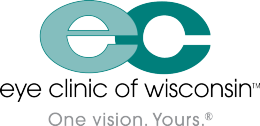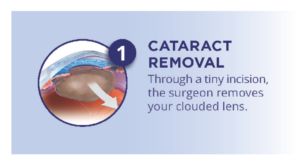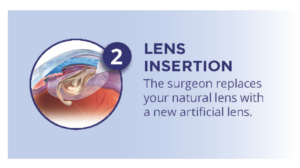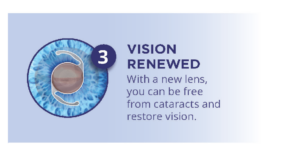Cataract Care
-
What is a Cataract?
A cataract is a clouding of the normally clear lens in your eye. Though painless, cataracts can blur your vision by restricting the amount of light that enters your eye. In addition to hazy vision, indications of cataracts include unusual glare, poor night vision, and a change in how your eyes perceive colors. All of these symptoms may be the result of the natural aging or clouding of the lens in your eye which is called a cataract.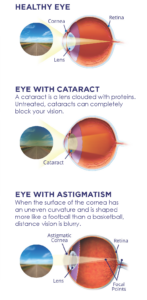
What is Cataract Surgery?
Cataract surgery is a safe and effective outpatient procedure for patients who have been diagnosed with cataracts. At the time of your cataract evaluation, our experienced ophthalmic staff will perform a thorough examination of your eyes and take precise measurements to determine the type of Intraocular Lens Implant (IOL) that is the best fit for your individual vision goals.During cataract surgery, the natural lens is broken up and removed from the eye. The surgeon then replaces that lens with a new artificial lens called an intraocular lens (IOL). The Eye Clinic of Wisconsin offers the region’s top cataract surgery and lens replacement program. Helping patients over the past 60 years see more clearly by using the industry’s most advanced technology to offer life-changing vision correction.
Vision Options with Cataract Surgery
When considering cataract surgery, it is important to understand that there are a variety IOL options that will match your lifestyle and vision goals.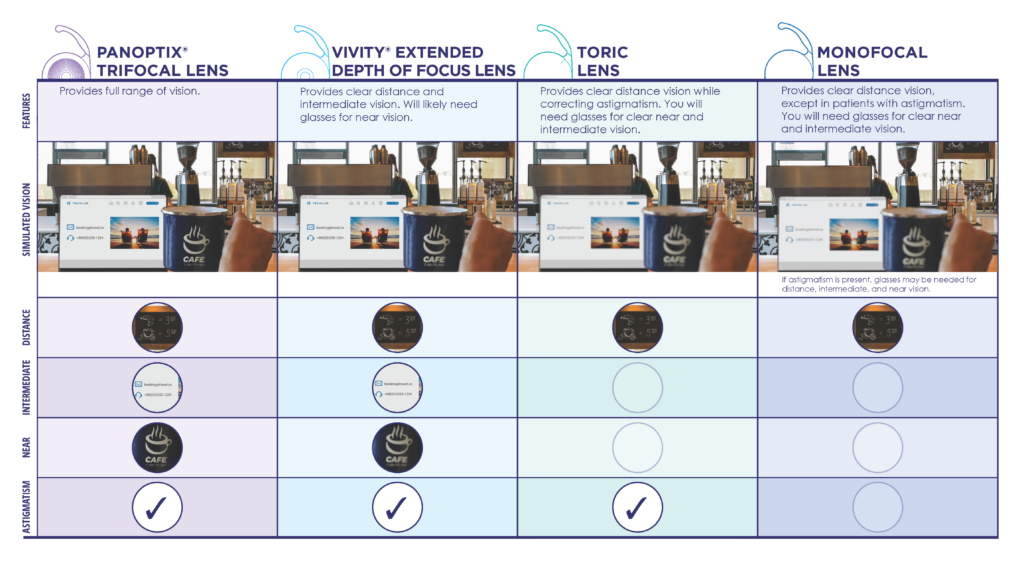
Standard Lens Implants (Monofocal)
Standard lens implants are a safe and effective option for patients who have been diagnosed with cataracts and who are comfortable with continued use of glasses following surgery. This lens is permanent and is a great choice for patients who want to see well at a distance and who don’t mind wearing glasses for near and medium distances.Toric Lens Implants (Astigmatism Correction)
For cataract patients who also have astigmatism, Toric lens implants offer a chance to enjoy quality distance vision with minimal need for glasses or contact lenses. A Toric lens implant has the astigmatism correction built into the lens.Extended Depth of Focus Lens Implant
The Extended Depth of Focus lens provides patients with high-quality distance and intermediate vision, and functional close-up vision. This premium intraocular lens increases independence from glasses or contact lenses. Your eyesight will be clearer and sharper in bright and dim lighting, but there are some cases where you may want to use reading glasses.Trifocal Lens Implant
The Trifocal lens is a premium implant that offers an amazing combination of near, intermediate, and distance vision. The range of vision delivered by the trifocal lens offers a considerable reduction in a patient’s need for glasses after cataract surgery. Particularly, this lens technology allows a patient to be able to see their cell phone, computer, and golf ball without glasses.Light Adjustable Lens Implant
The unique feature of the Light Adjustable Lens is that the shape and focusing characteristics can be changed after implantation in the eye using an office-based UV light source called a Light Delivery Device. The new shape of the lens will match the prescription you selected during your eye exam.
Several premium lenses are available, and Eye Clinic of Wisconsin’s physicians offer a variety of options to provide you with the most appropriate treatment for your visual needs. These lenses are generally not covered by insurance and require an additional out-of-pocket cost to the patient.
-
Cataract Premium Lens Candidacy Test
The doctors at the Eye Clinic of Wisconsin want to help you determine whether or not you are a candidate for one of the premium intraocular lenses as part of your cataract surgery. These advanced lenses can help reduce a patient’s dependency on glasses. In order to better understand if you would be a good candidate for a premium lens, please take a moment to complete the form below. Once your visual needs and lifestyle requirements have been determined, it will be easier for our team to answer any of your questions relating to cataract surgery or any other vision correction procedure. After you submit your test form, a member of our team will contact you to discuss the results and your vision correction options.
-
During surgery, the doctor will begin by making a small incision in the surface of the eye in order to remove the clouded lens. A small ultrasonic instrument is inserted in the eye to break up the cataract and remove it. Through the small incision a new artificial lens called an intraocular lens (IOL) is placed in the eye. The IOL will not change the outward appearance of your eye, but it can drastically improve your vision. The exact shape and size of each IOL may vary, but all are held in place by small flexible loops called haptics that are attached to the lens. IOL’s are intended to last a lifetime, and are made of materials like silicone and acrylic that will not irritate your eye.
Learn more about your physicians here.
You will be asked to return the day after surgery to be examined by a doctor. Several eye drops will be used for three to four weeks to help the eye fully recover from the surgery. Once your eye has completely healed following the surgery, your vision should be clearer, though you may still need corrective lenses to optimize your vision. However, Eye Clinic of Wisconsin offers options that can reduce your dependency on contacts or glasses after cataract surgery. If this is of interest to you, be sure to discuss the possibilities of advanced lens implants or post-cataract refractive surgery (ecLASIK) at your consultation.
-
New Advancement for People with Mild to Moderate Open-Angle Glaucoma to Help Reduce the Need for Eye Drops.
The Eye Clinic of Wisconsin has always stayed on the forefront of technology in eye care. Today, almost every aspect of vision is connected to a product or procedure that wasn’t available even 10 years ago. The newest example of this is the use of the iStent which makes treating glaucoma part of treating your cataract.
iStent is the first FDA approved device that improves your eye’s natural fluid outflow to safely lower eye pressure. Proven safe and effective, the iStent is the smallest medical device ever approved by the FDA. It is placed in your eye during cataract surgery and is so small that you won’t be able to see or feel it after the procedure is over. iStent is designed to create a permanent opening in your trabecular meshwork, and works continuously to improve the outflow of fluid from your eyes to help control eye pressure.
We are pleased to be able to offer this new technology to patients in North Central Wisconsin. The Eye Clinic of Wisconsin has one of the first providers in the area to perform this procedure. Once implanted, iStent will begin working to safely and effectively manage your eye pressure. It may help to reduce your dependency on glaucoma medications.
If iStent sounds like something you may be interested in, call the Eye Clinic of Wisconsin at 800.472.0033.
-
What is a Cataract Surgery?
Watch the following playlist to understand more about Cataract Surgery and your treatment options. To read more about Cataract Surgery, click here. -


